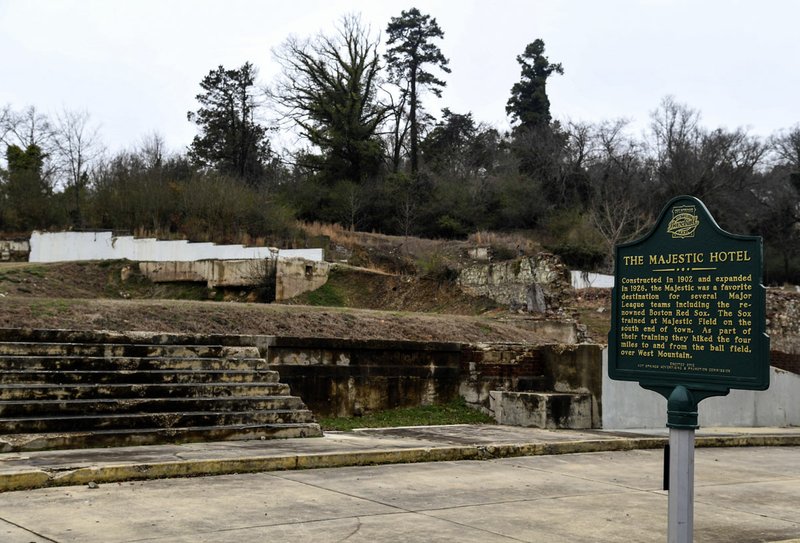HOT SPRINGS -- Soliciting proposals for the long-awaited redevelopment of the Majestic Hotel site is imminent, the city said Wednesday. In fact, the city expects to proceed by Friday or early next week.
The more than 5 acres at 100 Park Ave. were scraped bare by a demolition contractor in late 2016 after the February 2014 fire that led to the abandoned property being condemned. City Manager Bill Burrough acknowledged that progress has been slow, but he reminded the Hot Springs Board of Directors that the redevelopment phase didn't begin in earnest until November 2018.
That's when state regulators certified that the site was free of environmental liabilities that could prohibit or limit redevelopment, reassuring potential investors and lenders that lead-contaminated soil in subsurface and groundwater borings collected during the 2017 environmental assessment had been removed from the site.
"It seems like we've been doing this forever, but we didn't get to start until 14 months ago," Burrough said.
Developers responding to the solicitation that the city expects to issue by next week will be submitting proposals that allow the city to retain ownership of the land, which Burrough said could be achieved through a long-term ground lease. City Attorney Brian Albright said any improvements to the property would revert to the city at the end of the lease, and the leaseholder would be responsible for the property's insurance premiums and real estate taxes.
He said the lease could be for a term of up to 99 years.
Proposals will be due in 45-60 days. The city will enter into lease negotiations with the developer whose proposal the board ranks highest. Burrough said if an agreement isn't reached within a specified time, negotiations will begin with the second-ranked proposer. A time frame for starting construction could be within six months of the lease being signed or the proposal receiving Planning Commission approval, he said.
Leasing the site rather than selling it benefits the city and developers, Burrough said.
"It gives us more control over what happens on the property," he told the board. "It's also something that could be very good for developers. They save their upfront capital."
Albright noted the tax advantages of a ground lease, which allows a developer to deduct lease expenses from taxable income.
"Dirt is not depreciable," Albright told the board. "If they paid for the property, they don't get to depreciate that, whereas any amount they paid for the ground lease is an expense, 100%."
Repaying the city for its $2.3 million investment in the property is one of nine core requirements that proposals must meet. Burrough said Wednesday that the ground lease could be negotiated to recoup the city's cost of acquiring the property, removing condemned structures and mitigating environmental liabilities.
Costs could be recovered in the first few years of the lease, Burrough said, allowing the developer to pay a nominal rent fee in subsequent years.
The city declined Grand Point Investment Group LLC's offer to buy the property last year. The hotel developer said it presented the city with a $2.1 million check, but the city said the offer amounted to a six-month option to negotiate a purchase and sale agreement. All but $100 would be rescinded, if no agreement were reached, the city said.
Albright said stipulating what can and can't be built on the site is easier to incorporate into a lease than a deed transferring ownership.
"It's much easier for us to do that than to do a deed with restrictive covenants," he told the board. "With a ground lease we can be more hands-on."
The city's zoning code provides an additional layer of control, it said, as proposals will need to receive planned development approval from the Planning Commission. Planned development is a site-specific zoning designation meant to encourage innovative design through less-restrictive regulations.
While its criteria aren't as rigid as those in other zoning districts, planned development status can't be approved without a detailed site plan listing setbacks, building sizes and other specifications. The property's current central business district zoning designation doesn't require setbacks, off-street parking or landscaping.
Deputy City Manager Lance Spicer told the board that proposals should take into consideration development of all 5 acres but that concepts that don't require the full acreage could be submitted as alternate submissions.
Design Workshop's recently completed market study ranked a thermal water complex distinct from amenities offered at bath houses in the national park and area hotel and spas as the best use for the property. The study said a thermal water experience would need to be distinct and inclusive, providing adult-only and family friendly options.
A high-end hotel with 75-150 rooms was ranked second. The three lowest-ranked uses were a mixed-use development featuring retail and restaurants, an amphitheater or performing arts center, and a residential development.
Metro on 01/30/2020

